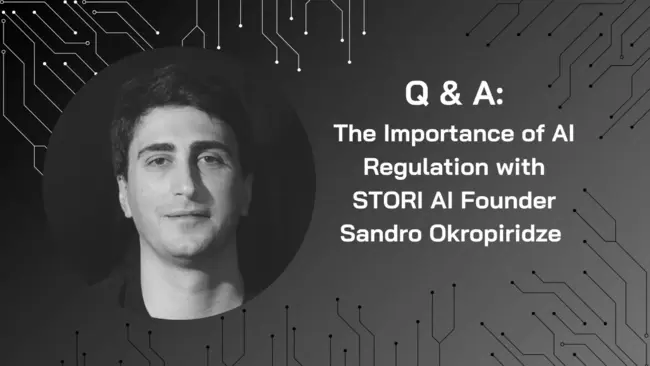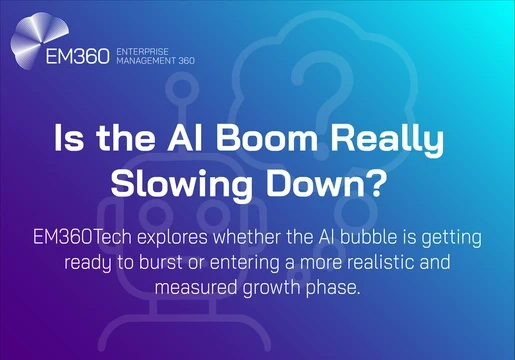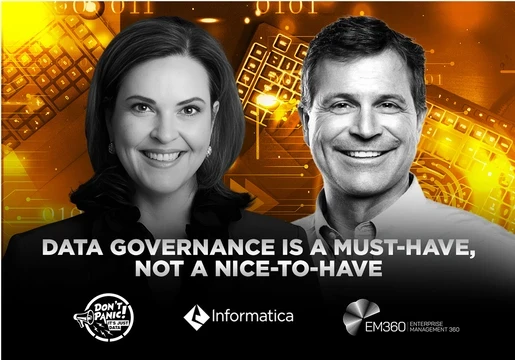As the AI arms race heats up, regulators around the world are scrambling to introduce guardrails that protect humanity from its rapid advancement.
We’re hot off the heels of the UK’s AI safety summit, which brought political leaders and tech executives together in Bletchley Park earlier this month to ensure that the benefits of AI are “harnessed for the good of humanity.”
Meanwhile, across the pond, US President Joe Biden recently signed an executive order to protect US citizens from the risks of AI, in what the White House called “the most significant actions ever taken by any government to advance the field of AI safety.”
But as governments world edge closer to introducing legislation to control AI development, concerns are mounting in the tech world about how regulation could impact the future of AI innovation.
Sandro Okropiridze – martech expert, co-founder and CEO of the AI-powered content creation platform STORI AI – however, believes regulating AI is crucial to the future of the tech.
He believes that regulating AI doesn’t stand in the way of innovation, but instead ensures progress is achieved in a way that benefits us all.
EM360’s Ellis Stewart spoke to Sandro about the importance of controlling AI and what businesses can expect from the future of regulation in the tech industry.

Ellis: In light of Biden’s Executive order on AI and the UK’s AI Safety Summit, how do you see regulation impacting innovation in the AI space?
Sandro: Regulation might slow down progress, but it saves time, money, and effort in the long run. We’ve seen it time and time again – emerging technologies going unregulated for years until problems arise, then governments down and companies are left scrambling to alter the products they’ve spent years building to ensure they’re up to standard.
Any developer with good intentions would rather know what we can and can’t do upfront. That way, we can build products that are safe and we know we won’t be forced to pay the bill in ten years time when lawmakers decide it's finally time to take action.
Ellis: Why is regulating AI so important? Is uncontrolled AI development as dangerous as some experts claim?
Sandro: It depends on which experts you’re listening to. Will the world be taken over by AI-killing machines intent on wiping us out? No, certainly not. But some humans are bad, which means AI will be used for harm.
The evidence is already there – deepfakes posted online to manipulate election results and voice generators used by scammers to convince people their family members have been taken hostage.
Tighter regulation will ensure that tools with the potential to cause damage are stopped before they’re made accessible, which I’m sure most would agree is something positive, even if it makes life slightly harder for AI companies.
Ellis: One of the key topics of discussion when we talk about AI is its potential impact on the job market – especially in spaces like marketing and content creation. What can we do as a society to prevent large-scale job displacement? Is it a case of tighter regulations, or does the workforce need to embrace AI as a co-pilot?
Sandro: The reality is that most small and medium businesses don’t have all that much money to spend on marketing anyway. If you have $10,000 to play with, you don’t go and hire a social media manager or content creator.
You probably have one person doing it all. Tools such as STORI AI don’t take that person’s job away – they simply take some of the workload off their shoulders. AI enables companies to do more with smaller budgets and earn more as a result.
This will ultimately provide funds not to hire less, but more. A little retraining might be necessary for some, but it’s not all that different from when machines replaced the human hand. There will still be jobs; the role might just be slightly different.
Ellis: As a martech expert and the co-founder and CEO of STORI, do you have any predictions for the future of AI-powered marketing?
Sandro: Marketing is often a numbers game – the more you put out, the more likely you are to see results, so I expect AI will be a game-changer for SMBs, enabling them to compete against the bigger names in their industries.
There is this fear that AI will make content bland and every brand’s tone of voice the same, but I don’t see it. With AI handling tasks such as social media post creation and scheduling, human marketers will be free to focus on the creative side of the profession.







Comments ( 0 )